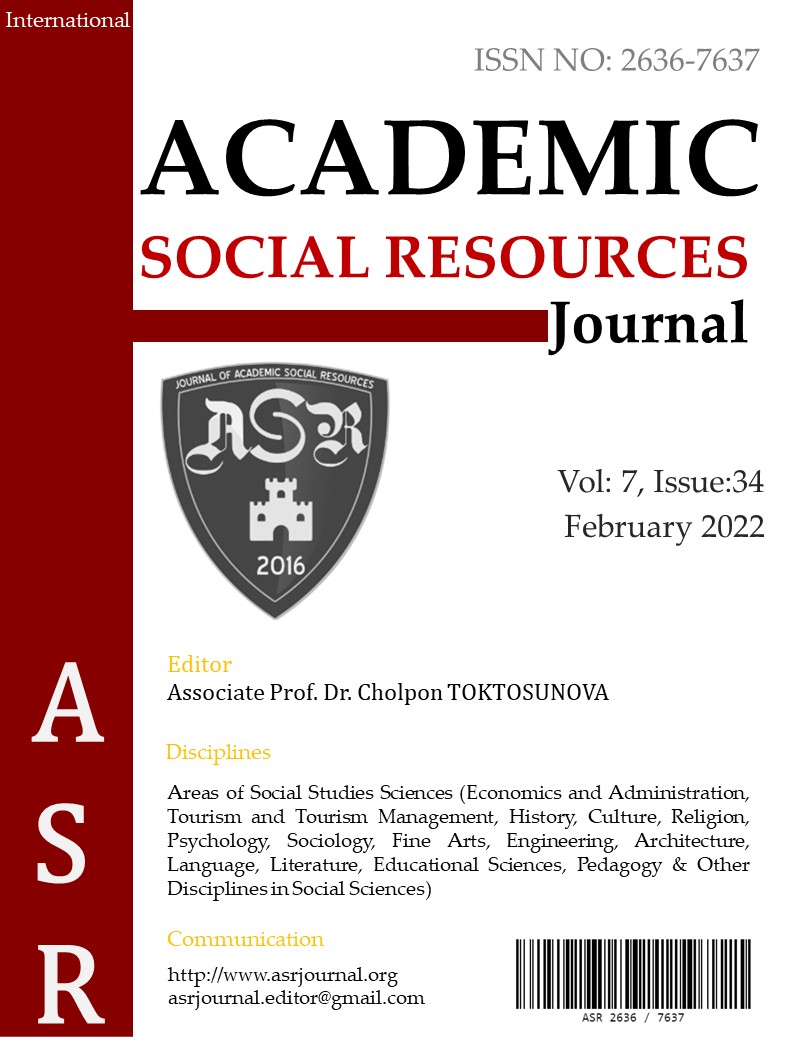Author :
Abstract
Covid-19 pandemi sürecinde birçok sektör organizasyonel küçülme veya iflas aşamasına gelmiştir. Özellikle turizm sektörü pandemiden en çok etkilenen sektörler arasında yer almaktadır. Bu zorlu süreçte çalışanların sosyal destek algıları ruh sağlıkları ve mutluluk düzeyleri açısından önemlidir. Bu düşünceden hareketle Antalya ilindeki 5 yıldızlı otel çalışanlarının sosyal destek algı düzeyleri ölçülmüştür. Algı düzeylerini ölçmek için üç boyutlu sosyal destek algı ölçeği kullanılmıştır. Örneklemi 165 katılımcının oluşturduğu araştırmada, çalışanların “aile” grubundan yüksek düzeyde sosyal destek algıladıkları belirlenmiştir. Ardından, katılımcıların sosyal desteği sırasıyla "arkadaş" grubundan yüksek düzeyde ve "önemli diğer" grubundan orta düzeyde algıladıkları görülmüştür. Araştırma kapsamında elde edilen bulgular doğrultusunda çeşitli çıkarımlar yapılmış ve önerilerde bulunulmuştur.
Keywords
Abstract
During the Covid-19 pandemic, many sectors have reached the stage of organizational downsizing or organizational bankruptcies. In particular, the tourism sector is among the sectors most affected by the pandemic. In this challenging process, employees' perceptions of social support are important in terms of their mental health and happiness levels. With this in mind, social support perception levels of employees of 5-star hotels in Antalya were measured. A three-dimensional social support perception scale was used to measure the perception level. In the study, whose sample consisted of 165 participants, it was determined that the employees perceived a high level of social support from the "family" group. Then, it was observed that the participants perceived social support from the "friends" group at a high level and the "significant other" group at a moderate level, respectively. In line with the findings obtained within the scope of the research, various inferences were made and suggestions were given.
Keywords
- Bowling, N. A., Beehr, T. A., Johnson, A. L., Semmer, N. K., Hendricks, E. A. & Webster, H. A. (2004),
- Bowling, N. A., Beehr, T. A., Johnson, A. L., Semmer, N. K., Hendricks, E. A. & Webster, H. A. (2004),“Explaining Potential Antecedents Of Workplace Social Support: Reciprocity or Attractiveness?”, Journal Of Occupational Health Psychology, 9(4): 339-350.
- Bowling, N. A., Beehr, T. A. & Swader, W. M. (2005), “Giving and Receiving Social Support at Work: The Roles of Personality and Reciprocity”, Journal of Vocational Behavior, 67(3):476-489.
- Büyüköztürk, S. (2008). Sosyal Bilimler İçin Veri Analizi El Kitabı. İstatistik, Araştırma Deseni SPSS Uygulamaları ve Yorum (6. baskı). Ankara: Pegem A.
- Caplan G. (1974). Support Systems and Community Mental Health: Lectures on Conceptual Development. Behav Public, New York.
- Cohen, S. & Wills T. A. (1985). ‘‘Stress, Social Support and Buffering Hypothesis’’, Psychological Bulletin, 98(2): 310–357.
- Eker, D. & Arkar, H. (1995). “Perceived Social Support: Psychometric Properties of the MSPSS in Normal and Pathological Groups in A Developing Country.” Soc Psychiatry Psychiatric Epidemiol, 30:121-126.
- Gottlieb, B. H., & Bergen, A. E. (2010). “Social Support Concepts and Measures.” Journal of Psychosomatic Research, 69(5): 511–520.
- Güldü, Ö. (2019). “Konaklama İşletmesi Çalışanlarının Algıladıkları Sosyal Desteğin İşe Bağlılık Düzeylerine Etkisi: Uzlaşabilirlik Kişilik Özelliğinin Aracılık Rolü.”Turizm Çalışmaları Dergisi , 1 (1): 17-28.
- Halis, M. & Demirel, Y. (2016). “Sosyal Desteğin Örgütsel Soyutlama (Dışlanma) Üzerine Etkisi.” Kastamonu Üniversitesi İktisadi ve İdari Bilimler Fakültesi Dergisi, 11 (1): 318-335.
- Kautish, P., Walia, S., & Kour, P. (2021). “The Moderating Influence of Social Support on Career Anxiety andCareer Commitment: An Empirical Investigation from India.” Journal of Travel & Tourism Marketing, 38(8): 782- 801.
- Kline, P. (1994). An Easy Guide to Factor Analysis. New York: Routledge.
- Kossek, E. E., Pichler, S., Bodner, T., & Hammer, L. B. (2011). “Workplace Social Support and Work–FamilyConflict: A Meta‐Analysis Clarifying the Influence of General and Work–Family‐Specific Supervisor and Organizational Support.” Personnel Psychology, 64(2): 289-313.
- Li J, Xia Y, Cheng X & Li S (2020). “Fear of Uncertainty Makes You More Anxious? Effect of Intolerance ofUncertainty on College Students’ Social Anxiety: A Moderated Mediation Model.” Front. Psychol. 11:565107. doi: 10.3389/fpsyg.2020.565107.
- Lin, J. H., Wong, J. Y., & Ho, C. H. (2014). “Beyond the Work‐to‐Leisure Conflict: A High Road Through Social Support for Tourism Employees.” International Journal of Tourism Research, 16(6): 614-624.
- Lin, Y. S., Huang, W. S., Yang, C. T., & Chiang, M. J. (2014). “Work–Leisure Conflict and Its Associations withWell-Being: The Roles of Social Support, Leisure Participation and Job Burnout.” Tourism Management, (45): 244- 252.
- Lindorff, M. (2001). “Are They Lonely at the Top? Social Relationships and Social Support Among Australian Managers”. Work & Stress, 15: 274 –282.
- Polatcı, S. (2015). “The Effects of Perceived Organizational and Social Support on Life Satisfaction: The MediationRole of Job And Marriage Satisfaction.” The International Journal of Economic and Social Research, 11(2): 25-44.Swanson, V. & Power, K., (2001). Employees’ Perceptions of Organizational Restructuring: The Role of Social Support. Work & Stress (15): 161-178.
- UNWTO (World Tourism Organization) (2019). Global Report on Women in Tourism – Second Edition, Madrid. World Tourism Barometer, 18(2), May.
- Usman, M., Cheng, J., Ghani, U., Gul, H. & Shah, W.U. (2021). “Social Support and Perceived Uncertainties DuringCOVID-19: Consequences For Employees’ Wellbeing.” Current Psychology. (23): 1-12. https://doi.org/10.1007/s12144-021-02293-3
- Zimet, G. D., Dahlem, N. W., Zimet, S. G., & Farley, G. K. (1988). “The Multidimensional Scale of Perceived Social Support.” Journal of Personality Assessment, 52(1), 30-41.





